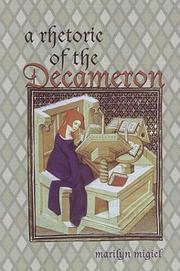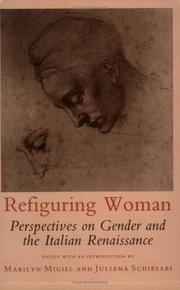| Listing 1 - 6 of 6 |
Sort by
|
Book
ISBN: 1442625759 1442631880 9781442625754 9781442631885 1442625767 Year: 2015 Publisher: Toronto
Abstract | Keywords | Export | Availability | Bookmark
 Loading...
Loading...Choose an application
- Reference Manager
- EndNote
- RefWorks (Direct export to RefWorks)
Marilyn Migiel returns to Giovanni Boccaccio's masterpiece, this time to focus on the dialogue about ethical choices that the Decameron creates with us and that we, as individuals and as groups, create with the Decameron.
Ethics in literature. --- Italian literature --- History and criticism. --- Boccaccio, Giovanni, --- Criticism and interpretation. --- Boccaccio, Giovanni --- Boccaccio, Jean --- Boccace --- Bocace, Jean, --- Bocacio, Juan, --- Boccace, --- Boccace, Jean, --- Boccacius, Ioannes, --- Boccacius, Joannes, --- Boccatius, Ioannes, --- Boccatius, Joannes, --- Bochas, John, --- Bokachʻchʻo, Jiovanni, --- Bokachʻio, Jiovanni, --- Bokkachchʹo, Dzhʹovanni, --- Bokkachio, Dzhiovanni, --- Vocacio, Juan, --- Боккаччо, Дж, --- באקאשטיא, --- באקאטשא, דזשעאוואני, --- באקאטשיא --- באקאטשיא, --- בוקאצ׳ו, ג׳ובאני --- Bocace, Jean --- Bocacio, Juan --- Boccace, Jean --- Boccacius, Ioannes --- Boccacius, Joannes --- Boccatius, Ioannes --- Boccatius, Joannes --- Bochas, John --- Bokachʻchʻo, Jiovanni --- Bokachʻio, Jiovanni --- Bokkachchʹo, Dzhʹovanni --- Bokkachio, Dzhiovanni --- Vocacio, Juan --- Боккаччо, Дж --- Decamerone (Boccaccio, Giovanni) --- To 1400 --- Novella di Griselda (Boccaccio, Giovanni) --- Decameron (Boccaccio, Giovanni) --- Decamerone da un italiano all'altro (Boccaccio, Giovanni) --- Decameron di messer Giovanni Boccacci, cittadino fiorentino (Boccaccio, Giovanni)

ISBN: 0802088198 0802085946 1281994731 9786611994730 1442670452 9781442670457 9781281994738 9780802088192 9780802085948 0802042147 Year: 2003 Volume: *13 Publisher: Toronto, Ont. University of Toronto Press
Abstract | Keywords | Export | Availability | Bookmark
 Loading...
Loading...Choose an application
- Reference Manager
- EndNote
- RefWorks (Direct export to RefWorks)
Both a passionate denunciation of masculinist readings of the Decameron and a meticulous critique of previous feminist analyses, Marilyn Migiel's A Rhetoric of the Decameron offers a sophisticated re-examination of the representations of women, men, gender identity, sexuality, love, hate, morality, and truth in Boccaccio's masterpiece. The Decameron stages an ongoing, dynamic, and spirited debate about issues as urgent now as in the fourteenth century ? a debate that can only be understood if the Decameron's rhetorical objectives and strategies are completely reconceived.Addressing herself equally to those who argue for a proto-feminist Boccaccio ? a quasi-liberal champion of women's autonomy ? and to those who argue for a positivistically secure historical Boccaccio who could not possibly anticipate the concerns of the twenty-first century, Migiel challenges readers to pay attention to Boccaccio's language, to his pronouns, his passives, his echolalia, his patterns of repetition, and his figurative language. She argues that human experience, particularly in the sexual realm, is articulated differently by the Decameron's male and female narrators, and refutes the notion that the Decameron offers an undifferentiated celebration of Eros. Ultimately, Migiel contends, the stories of the Decameron suggest that as women become more empowered, the limitations on them, including the threat of violence, become more insistent.
Femme (Théologie chrétienne) dans la littérature --- Femmes dans la littérature --- Femmes dans la poésie --- Femmes dans le théâtre --- Vrouw (Christelijke theologie) in de literatuur --- Vrouwen in de literatuur --- Vrouwen in de poëzie --- Vrouwen in het toneel --- Woman (Christian theology) in literature --- Women in drama --- Women in literature --- Women in poetry --- Literary rhetorics --- Boccaccio, Giovanni --- Women in literature. --- Boccaccio, Giovanni, --- LITERARY CRITICISM / European / Italian. --- Decamerone (Boccaccio, Giovanni) --- Novella di Griselda (Boccaccio, Giovanni) --- Decameron (Boccaccio, Giovanni) --- Decamerone da un italiano all'altro (Boccaccio, Giovanni) --- Decameron di messer Giovanni Boccacci, cittadino fiorentino (Boccaccio, Giovanni)
Book
ISBN: 9781487542580 9781487542597 9781487542603 Year: 2022 Publisher: Toronto, Ont. University of Toronto Press
Abstract | Keywords | Export | Availability | Bookmark
 Loading...
Loading...Choose an application
- Reference Manager
- EndNote
- RefWorks (Direct export to RefWorks)
"Since the late twentieth century, the Venetian courtesan Veronica Franco has been viewed as a triumphant proto-feminist icon: a woman who celebrated her sexuality, an outspoken champion of women and their worth, and an important intellectual and cultural presence in sixteenth-century Venice.In Veronica Franco in Dialogue, Marilyn Migiel provides a nuanced account of Franco's rhetorical strategies through a close analysis of her literary work. Focusing on the first fourteen poems in the Terze Rime, a collection of Franco's poems published in 1575, Migiel looks specifically at back-and-forth exchanges between Franco and an unknown male author. Migiel argues that in order to better understand what Franco is doing in the poetic collection, it is essential to understand how she constructs her identity as author, lover, and sex worker in relation to this unknown male author. Veronica Franco in Dialogue accounts for the moments of ambivalence, uncertainty, and indirectness in Franco's poetry, as well as the polemicism and assertions of triumph. In doing so, it asks readers to consider their ideological investments in the stories we tell about early modern female authors and their cultural production."--
Book
ISBN: 0300048718 Year: 1992 Publisher: New Haven, Conn. Yale University Press
Abstract | Keywords | Export | Availability | Bookmark
 Loading...
Loading...Choose an application
- Reference Manager
- EndNote
- RefWorks (Direct export to RefWorks)


ISBN: 0801425387 080149771X Year: 1991 Publisher: Ithaca, N.Y. Cornell University Press
Abstract | Keywords | Export | Availability | Bookmark
 Loading...
Loading...Choose an application
- Reference Manager
- EndNote
- RefWorks (Direct export to RefWorks)
Book

ISBN: 9781501737220 Year: 2019 Publisher: Ithaca, NY
Abstract | Keywords | Export | Availability | Bookmark
 Loading...
Loading...Choose an application
- Reference Manager
- EndNote
- RefWorks (Direct export to RefWorks)
| Listing 1 - 6 of 6 |
Sort by
|

 Search
Search Feedback
Feedback About UniCat
About UniCat  Help
Help News
News